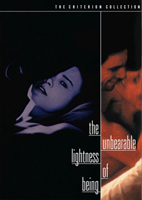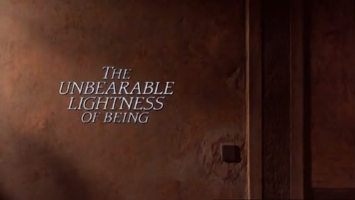1999:  (out of print by 6/01)
(out of print by 6/01)

directed by Philip Kaufman
screenplay by Jean-Claude Carriere and Philip Kaufman
after the novel by Milan Kundera (1984)
Criterion #55.
Art experience is social experience, and time spent watching a movie is time spent in the company of actors. I like actors. I guess in some way everybody does, or at least everybody likes famous people. But I mean that I like actors for their actorliness. I like these people who treat being sensitive like serious business. I like what they care about and try to be good at, and what kinds of expression seem possible in the space they create. Yes, it’s true that actors often have emotional problems and are difficult and believe crazy things. But, you know, everyone has emotional problems, and everyone is difficult, and everyone believes crazy things.
In this movie, in the scene where Juliette Binoche delightedly singsongs “You’re jealous! You’re jealous!” to Daniel Day-Lewis, I enjoyed being allowed to share a moment of intimacy in the lives of two fictional characters, but more than that, I enjoyed contemplating a moment of real artistic intimacy between two actors. Whatever is recognizable and true-to-life about this dance that she’s doing and the sheepish way he’s responding, they arrived at it together, in trust, with shared purpose. Actors working together call on a mutual expertise in feelings. I wish everyone always called on a mutual expertise in feelings, so I feel comforted seeing that such a degree of shared experience is at least possible. He knew what she was doing, and she knew what he was doing. They each knew what the other meant, about people, about life, and then they honored it by living it out in the flesh. For the camera.
Even when characters in movies are hurting each other, the actors are actually doing something very intimately collaborative. There is something touching about the idea that any interpersonal engagement, no matter how contentious, is a mutual act of moment-creation, of life-creation.
(Of course, none of this is necessarily the case. Sometimes actors hate their scene partners and just do their own thing. Sometimes directors hate their actors and treat them like puppets.)
The Unbearable Lightness of Being is about the personalities and interpersonal dynamics in a love triangle. I gather that the book may be about a lot of high philosophy on top of that. The movie is pretty much just that, but with warm actorly care and a mellow spirit. One is free to think philosophical thoughts.
There are plenty of dramatic developments but it doesn’t have a plot per se. It offers emotional tone above all — all art does, I suppose — and here that emotional tone is personable; person-like. Actor-like, in fact. Why are some people rewarding to be around? What does their company offer? That’s the objective here, it would seem. At least that’s what it accomplishes.
It does reach a strong cinematic-philosophical flourish at the end. Having spent the duration in this particular company, I found that I was all in.
The film is not perfectly and ideally flexible, human, old world. It is an American-eye view. Sometimes all the nudity and the politics felt slightly more “European” than European. The moments do not quite just melt and reform; in the cuts from scene to scene, I felt the rooms and situations being produced and directed into existence. The movie sometimes slinks around behind the actors’ backs as though it knows more than they do. That I doubted.
I wasn’t transported; I was always aware that this was a production, an ambition, not the thing itself. But it was a congenial ambition, and the actors in it were real people.
The editorial presence gets one thing so very right that all hints of American calculation are readily forgiven: the music, selected from the works of Janáček, who was committed to pure intensity of feeling more than nearly any other composer. Almost everything he wrote is emotional to the point of philosophy. The most important selections here are “The Madonna of Frydek” from The Overgrown Path and the third movement of the Fairy Tale for cello and piano. But my ripped selection, the only piece truly in the clear, has to be the end credits, which is from the fifth movement of Janáček’s Idyll for strings.
Maybe the movie steals much of its emotional timbre from the music, and the actors themselves, and everything but the script and actual content, but that’s fine; the important thing is that it works as a place, a person, a familial attitude. Saying that it is congenial is not meant to be faint praise. Congeniality is a welcome gift.
I would be remiss if I did not address the title.
Get a load of that title. It’s so satisfying to say, and it takes some deep thought to parse. It’s either a beautiful poem or rhythmic nonsense. Who’s to say? That’s a powerhouse title. One of the all-time most dynamic titles. Much better than Nesnesitelná lehkost bytí.
As a service to the reader, here is my report on the meaning of the title as parsed by the movie: “lightness” is the innocent spirit of moral freedom that allows our man Daniel to pursue extramarital sex without any sense of transgression. His wife recognizes the aliveness of this lightness, contrasted with her weighty wounded feelings — that such freedom is a pure state of being, and thus philosophically preferable to her neediness — but she cannot find it in herself to emulate it or bear it in him, because loneliness and jealousy are real too. So the subject of the title is one’s lover’s existential freedom, which is both beautiful and unacceptable.
This might very well be a gross simplification or distortion of Kundera’s intention. I wouldn’t be at all surprised if the title means something quite different in the book. Nor would I be surprised if it means exactly this. Bottom line: I am unsurprised.
Tip for being funny, brought to you by a primitive part of my brain: say this title but change some of the words. The crucial words here are “unbearable,” “lightness,” and “being”; focus on those. If you say the title but change one those three words to a word that sounds like it but is somehow different from it, you’re sure to win admirers and have some fun in the process.
All written before listening to the commentary (by the director, the co-writer, the editor (Walter Murch, offering some fascinating shop talk), and Lena Olin).
Watching this movie again with the intelligent, craft-oriented commentary, I can’t help but feel like now I’m seeing it all more clearly, “as it really is.” And it’s quite different from the movie I described above. “What was I saying?” I think. “Congenial? Person-like? American? No plot per se?” Not only are the voices not confirming these things, but even I can’t see them anymore.
But it’s all going to stand. That’s the movie I saw when I was alone, when I was me. The fact that my experience isn’t being described to me by the artists only goes to show that our respective roles are completely different. Watching a movie is a dream; making a movie can almost never be a dream.
Or perhaps a better way of looking at it is that this commentary reveals the very Americanness I meant: under the humanist flesh, this is a movie of bones. Other artists might well have made a soft commentary. This is a hard one. Smart; but smart can be a trap.
Case in point: Philip Kaufman tells us that he was inspired by the Czech attitude that sexual pleasure, being free and private and sensory, is not subject to politicization and thus that sex is “an act of resistance.”
I say: calling something “an act of resistance” is politicizing it. Some might say I miswatched the movie by seeing the sex as very much just sex, something to smile about, but I do not think I am miswatching life. And seeing things in movies is part of my life.
As with life, commentary does not actually improve understanding.
Remember the days before commentary tracks? Someone at Voyager/Criterion invented this gimmick and now we all buy into its value. But bonus features are aesthetic quicksand. Movie is a movie is a movie: if you gotta ask, you ain’t got it.
The Unwearable Rightness of Peeing
It’s one of the best features of time that one gets to have different interpretations of a thing at different times and hold them all in their mind’s cabinets. You may feel (or have felt when you wrote your addendum) that you could no longer feel the movie that first way, but that feeling is still there for you.
http://wordswithoutborders.org/dispatches/article/the-un-x-able-y-ness-of-z-ing-q-a-list-with-notes1